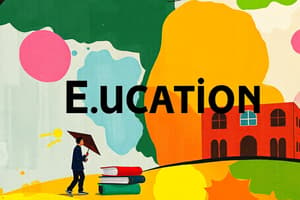Podcast
Questions and Answers
What is the primary purpose of education?
What is the primary purpose of education?
- To develop critical thinking and prepare individuals for the workforce (correct)
- To enforce government regulations
- To provide entertainment through learning
- To create a competitive job market
Which type of education is defined as unstructured learning outside traditional settings?
Which type of education is defined as unstructured learning outside traditional settings?
- Informal Education (correct)
- Formal Education
- Non-formal Education
- Online Education
What is a key characteristic of non-formal education?
What is a key characteristic of non-formal education?
- Organized activities outside the formal education system (correct)
- Standardized testing methods
- Structured curriculum in public schools
- Unpaid tuition for all participants
Which educational theory emphasizes reinforcement as a response to external stimuli?
Which educational theory emphasizes reinforcement as a response to external stimuli?
What is meant by 'inclusive education'?
What is meant by 'inclusive education'?
What is a challenge in education regarding technology?
What is a challenge in education regarding technology?
Which of the following is a characteristic of public education?
Which of the following is a characteristic of public education?
What is the focus of constructivism in education?
What is the focus of constructivism in education?
Flashcards are hidden until you start studying
Study Notes
Overview of Education
- Definition: Process of facilitating learning, acquiring knowledge, skills, values, and habits.
- Purpose: To develop critical thinking, prepare individuals for the workforce, and promote social cohesion.
Types of Education
-
Formal Education
- Structured curriculum, typically in schools and universities.
- Includes primary, secondary, and higher education.
-
Informal Education
- Unstructured learning outside traditional settings.
- Examples include self-directed learning, community education, and life experiences.
-
Non-formal Education
- Organized educational activities outside the formal system.
- Includes workshops, adult education, and vocational training.
Educational Systems
- Public Education: Funded by government; typically free for students.
- Private Education: Funded by tuition fees; often offers specialized curricula.
- Online Education: Digital platforms offering courses and degrees; flexible and accessible.
Key Concepts
- Curriculum: A set of courses and content offered in an educational institution.
- Pedagogy: The method and practice of teaching; can vary significantly across cultures and disciplines.
- Assessment: Tools used to measure student learning, including tests, quizzes, and projects.
Educational Theories
- Behaviorism: Learning as a response to external stimuli; emphasizes reinforcement.
- Cognitivism: Focuses on mental processes; learning as a process of internalizing information.
- Constructivism: Knowledge is constructed through experience; encourages critical thinking and problem-solving.
Current Trends
- Technology in Education: Use of digital tools (e.g., online courses, educational apps) to enhance learning.
- Inclusive Education: Ensuring all students, regardless of ability, have access to quality education.
- Lifelong Learning: Emphasizes continuous education beyond traditional schooling.
Challenges in Education
- Access and Equity: Disparities in educational opportunities based on socioeconomic status, geography, and other factors.
- Quality of Education: Ensuring high standards of teaching and learning resources.
- Adaptation to Change: Keeping up with technological advancements and changing job markets.
Global Perspectives
- Education Policies: Vary by country; influenced by cultural, economic, and political contexts.
- Development Goals: Education is a key focus in initiatives like the UN Sustainable Development Goals (SDGs), particularly Goal 4: Quality Education.
Conclusion
- Education is a vital sector that shapes individuals and societies.
- Continuous evolution and adaptation are necessary to meet the challenges and opportunities of the modern world.
Overview of Education
- Education is a process designed to facilitate learning, aimed at acquiring knowledge, skills, values, and habits.
- It serves the purpose of developing critical thinking, preparing individuals for the workforce, and promoting social cohesion.
Types of Education
- Formal Education: Involves a structured curriculum typically provided in schools and universities, encompassing primary, secondary, and higher education.
- Informal Education: Covers unstructured learning occurring outside traditional institutions, such as self-directed learning and life experiences.
- Non-formal Education: Comprises organized educational activities outside the formal education system, including workshops and vocational training.
Educational Systems
- Public Education: Funded by the government, making it typically free for students and focusing on general accessibility.
- Private Education: Funded through tuition fees and often provides specialized curricula tailored to specific educational goals.
- Online Education: Offers access to courses and degrees via digital platforms, featuring increased flexibility and accessibility.
Key Concepts
- Curriculum: Defines the set of courses and content offered within an educational institution, forming the backbone of formal education.
- Pedagogy: Encompasses various methods and practices of teaching, which can differ across cultures and educational disciplines.
- Assessment: Utilizes diverse tools for measuring student learning, including tests, quizzes, and projects to evaluate educational outcomes.
Educational Theories
- Behaviorism: Views learning as a response to external stimuli, emphasizing reinforcement and observable behaviors.
- Cognitivism: Focuses on mental processes involved in learning, suggesting that knowledge acquisition is a process of internalizing information.
- Constructivism: Proposes that knowledge is actively constructed through experiences, promoting critical thinking and problem-solving skills.
Current Trends
- Technology in Education: Integrates digital tools like online courses and educational apps to enhance and modernize learning experiences.
- Inclusive Education: Prioritizes access to quality education for all students, regardless of their abilities or backgrounds.
- Lifelong Learning: Advocates for continuous education beyond traditional learning environments, recognizing the importance of ongoing personal and professional development.
Challenges in Education
- Access and Equity: Highlights disparities in educational opportunities influenced by factors like socioeconomic status and geographical location.
- Quality of Education: Focuses on the need for high teaching standards and adequate learning resources to improve overall educational effectiveness.
- Adaptation to Change: Emphasizes the importance of keeping up with rapid technological advancements and evolving job market requirements.
Global Perspectives
- Education Policies: Differ across countries and are shaped by cultural, economic, and political contexts.
- Development Goals: Education plays a crucial role in global initiatives such as the UN Sustainable Development Goals (SDGs), particularly in achieving Goal 4: Quality Education.
Conclusion
- Education is essential for shaping individuals and societies, necessitating ongoing evolution and adaptation to address modern challenges and opportunities.
Studying That Suits You
Use AI to generate personalized quizzes and flashcards to suit your learning preferences.




